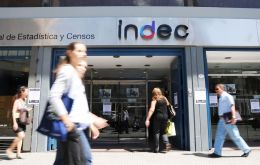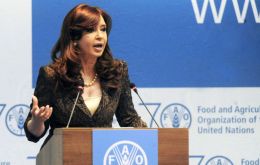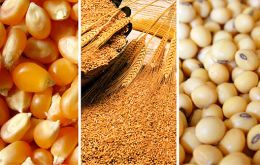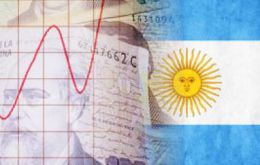MercoPress. South Atlantic News Agency
Tag: Indec index
-
Friday, June 26th 2015 - 06:19 UTC
Argentine industrial production down in May but some sectors are recovering

Argentine industrial production fell 0.3% in May compared to the same month last year, marking its 22nd consecutive decrease according to the INDEC statistics bureau. Taking into account the first five months of 2015, industrial activity decreased 1.5% compared to the same period of 2014.
-
Wednesday, June 17th 2015 - 05:14 UTC
Tierra del Fuego's May inflation almost three times the official 1% rate

Tierra del Fuego's Consumer Prices Index, CPI for May was almost three times higher than the Argentine government official index from stats office Indec: 2.7% against 1%. The percentage was provided by Tierra del Fuego's Stats and Census Office, which also shows that in the first five months of the year inflation reached 11.4% and 28% in the last twelve months, well above the 15.3% from Indec.
-
Tuesday, June 16th 2015 - 06:11 UTC
Argentina's May official inflation 1% or half that claimed by private consultants

Argentina's National Statistics and Census Institute, Indec reported on Monday that the inflation rate for May reached 1%, totaling 15.3% in the last twelve months and 5.7% for the first five months of 2015.
-
Monday, June 15th 2015 - 06:44 UTC
Catholic Church points out that 25% of Argentines are below the poverty line

The Argentine Catholic Church has stood out strongly on the controversy that has followed President Cristina Fernandez statement before the FAO assembly in Rome arguing that poverty in Argentina is below 5%, which was later made superlative by her spokesperson and cabinet chief Anibal Fernandez arguing that poverty in Argentina was less than in Germany or Denmark.
-
Tuesday, June 9th 2015 - 07:49 UTC
Argentina is paradise: poverty below 5% rate Cristina Fernandez tells the world

Argentine President Cristina Fernández sparked controversy on Sunday when in a speech before the FAO conference in Rome, she endorsed widely disputed government figures on poverty, saying the rate was “below five percent,” adding that destitution in the country stood at 1.27%. If this was correct Argentina's poverty rate is below that of OECD rich league members.
-
Wednesday, May 27th 2015 - 04:59 UTC
Argentine economic activity up 2% in March, but industrial production down

Good and bad news for Argentina's economy: the latest figures from the National Statistics and Census Institute (INDEC) reveal that economic activity increased 2% percent in March, compared to the same month last year, but industrial production recorded its 21st negative consecutive month in April.
-
Wednesday, May 20th 2015 - 05:00 UTC
Argentine inflation for April: official index 1.1%; Congressional index, 2.1%

Inflation in Argentina during April reached 2.1% and 29% in the last twelve months according to the latest release from private consultants, an average of which is announced every month as the 'Congressional index' by members from the Lower House Freedom of Expression committee.
-
Wednesday, May 20th 2015 - 03:52 UTC
Unemployment in Argentina stable at 7.1%, but jobless have stopped looking for work, said Indec

Argentina's Indec stats office latest release shows that unemployment was stable in the first quarter, at 7.1% in the yearly comparison, but that is only because some of the jobless have stopped looking for work, as employment rates continued a declining trend which started in 2011.
-
Saturday, April 25th 2015 - 05:41 UTC
Argentine economy picking up boosted by agriculture; manufacturing continues downfall

Economic activity in Argentina expanded 1.4% in February compared to the same month last year, boosted by the agricultural sector and a hike in consumption, making it the highest increase since January 2014, according to the latest release from the country's stats office, Indec.
-
Monday, April 20th 2015 - 06:20 UTC
March inflation in Argentina ranges from 1.3% to 2.12%

Argentine inflation in March reached 2.12% over February accumulating 29.8% in the last twelve months according to the average of private consultants, which every month is released by opposition members in Congress. This is one percentage point higher than the official March rate announced by the Argentine government's discredited stats office, Indec, 1.3%.
